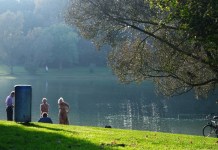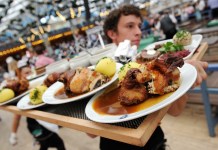There is an admirable calm in Angela Merkel that contrasts immensely with the bluster and hysteria that has come to dominate a lot of the political discourse in Europe. So when on Saturday she distanced herself from the “Wir schaffen das” (we can do it) slogan she’d so often repeated about the refugee crisis, many wondered if the chancellor had lost her confidence. Merkel may not be called “Mutti” that often any more.
Yet she remains Europe’s towering figure. She also appears rather lonely at the top. In fact, Germany as a whole looks lonely these days, as it deals with the monumental task of integrating more than a million refugees, whose arrival last year up-ended politics and triggered much national soul-searching.
Don’t be under any illusion that diplomacy, whether at the European summit in Bratislava or in New York, where the UN summit on refugees opens on Monday, will offer much relief. Germany will basically need to cope on its own. If I had to bet, I’d say its chances are good. This is arguably the single most important challenge Europe faces: overcoming the shock of seeing huge numbers of victims of the world’s chaos turn up in cities and regions previously sheltered from external disruption. Germany stands at the heart of this test, and its neighbours are watching closely.
There is no lack of gloomy predictions. Nor is schadenfreude entirely absent when Germany’s European partners wring their hands at the refugee problem. (France’s prime minister, Manuel Valls, stooped low last year when he publicly smirked at suggestions Merkel should get the Nobel peace prize for welcoming refugees.) No small amount of criticism has been levelled at Merkel from populists across the continent, as well as from within her own party and governing coalition. Much less vociferously highlighted are the reasons why Germany may just succeed.
Of course, public mood can swerve in unpredictable directions. Amazing scenes of Germans applauding refugees as they got off trains were swiftly forgotten after the Cologne New Year’s Eve attacks. That’s not to say German civil society isn’t deploying impressive efforts to make sure the migration phenomenon ends on a positive note.
On a recent study tour of “Germany and the refugees story” organised by the Robert Bosch Foundation, I met incredibly dedicated social workers, NGO representatives and city or regional officials in Cologne and Stuttgart. Many did speak of the difficulties they encounter, not least the bureaucratic hurdles that stand in the way of easing refugees into the labour market after they’ve taken German language courses. But what struck me was how upbeat most of these interlocutors wanted to appear. Merkel may want to play down “Wir schaffen das”, but those words have nevertheless said something about the nation’s state of mind. One outstanding example of can-do spirit comes from a business in Stuttgart called Lapp Group, which has taken 12 young refugees into apprenticeship programmes. Hearing these smiling young men from Syria, Afghanistan and Eritrea describe how they intend to make the most of this chance helps dispel doubts. The Lapp family, who founded this electric cable producing firm in the 1950s and still run it, are keen to take their proud share of a nationwide effort.
Just as Germany reinvented itself after the war, and just as it achieved reunification, this is seen as a defining moment in the country’s history. The Lapp family’s role may be small in the wider picture, but it certainly makes the word “solidarity” sound less empty than it does in much of the rest of Europe.
If any country can succeed in coping with a massive influx of refugees, surely this is it. Stuttgart’s lush residential neighbourhoods and its industrial powerhouses point to Germany’s thriving economy. And the prosperity and stability of Germany’s institutions are key assets in the integration effort. Unemployment is at its lowest since 1990, and trade surpluses are at a record high. As Armin Laschet, deputy federal chairman of Merkel’s CDU party, puts it, the question isn’t so much whether Germany can afford financially to deal with the refugee equation, “it’s whether our society can get to grips” with the new situation.
Globalisation is widely faulted for breeding populism. But Germany has dramatically benefited from globalisation, thanks to its exports. What is at stake here has more to do with adapting to new forms of diversity, as the country imports population groups. This is the first ever wave of Arab immigrants to Germany, whose Muslim community had since the 1950s been essentially composed of Turkish “Gastarbeiter” (guest workers).
The positive side is that Germany has none of France’s historical hangovers in dealing with Arab immigration. The less positive side is that it took decades for Germans to accept that Turkish workers and their families would stay and become full citizens.
It’s been said German officials have tried to paper over the magnitude of the task – including when information was scant about the Cologne attacks. But it’s hard to deny that managing public perceptions is as important as setting up education, housing and work for the newly arrived. This sits at the centre of Merkel’s numerous “keep calm” messages. It is also at the centre of Germany’s revived interest in European defence and security. Merkel is acutely aware that if terrorism rears its head again, as it did this summer, the nation’s quest for a new sense of cohesion might quickly be shattered.
Germany’s strengths in addressing its refugee challenge can be easily overlooked. The reasons why Merkel repeated “Wir schaffen das” so often have not suddenly vanished – even if she’s toned down the message. But just as Europe needs Germany to succeed in integrating refugees (otherwise populists will benefit everywhere), the country needs Europe to act collectively to make sure the conditions for integration aren’t thwarted by violence. Loneliness is something it can’t afford.








